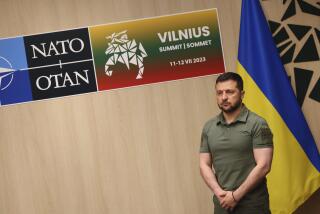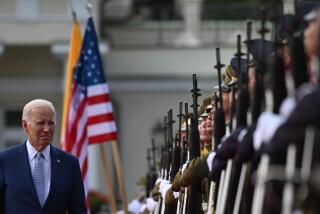NATO Chief Endorses INF Treaty : Galvin Says He Could Still Deter Aggression and Defend Europe
- Share via
WASHINGTON — The top allied commander in Europe, disputing his predecessor, endorsed the INF treaty in Senate testimony today and said he could still deter Soviet aggression and defend Europe under the pact.
Gen. John R. Galvin, whose support for the treaty is at odds with the strong opposition of Gen. Bernard W. Rogers, who retired last June as NATO commander, also told the Armed Services Committee that the accord “carries some risks--risks that are avoidable if given proper attention. . . . I am convinced that the treaty should be ratified.”
Galvin said he told President Reagan last year as negotiations on eliminating superpower ground-based medium-range nuclear missiles neared conclusion that he could “still do the mission assigned to me in Europe--deterrence and defense.”
Rogers said Monday that the treaty is “wrong” and that “we should not” have it, but that not to approve its ratification could be disastrous for NATO.
5 Former Secretaries
Also quizzed on the treaty today were five former secretaries of defense, including the just-retired Caspar W. Weinberger, who appeared before the Senate Foreign Relations Committee where the current chief, Frank C. Carlucci, appeared Monday.
All expressed support for the treaty.
Weinberger strongly defended the Administration’s stand on the pact against criticism by conservatives, including Sen. Jesse Helms (R-N.C.) but agreed with Helms that the United States must have an express policy for reacting to Soviet cheating.
Weinberger addressed Helms’ concerns about an approximate 300-missile difference in CIA and Defense Intelligence Agency estimates of the number of Soviet SS-20 missiles, the type that would be eliminated under the INF pact.
“I don’t know whether they have 300 more missiles or not,” he told Helms. “No one has claimed that the verification is 100% perfect.”
‘Definition of Truth’
“There’s been a lot of Soviet cheating in the past,” Weinberger said. “Their definition of truth . . . is different from ours,” he said, adding that the Soviet definition is anything that furthers their own interests.
Weinberger also came out forcefully against Soviet Foreign Minister Eduard A. Shevardnadze’s recent statements that NATO cannot modernize NATO’s battlefield-range nuclear weapons under the INF treaty.
“NATO security is not in Mr. Shevardnadze’s hands, nor is it within his purview to dictate to us how we shall see to that security,” he said in a statement.
Former Defense Secretary James R. Schlesinger expressed the most reservations about the treaty, saying that it has strained the Western alliance and that danger lies in using its verification procedures as a precedent for more comprehensive agreements later, such as a strategic arms reduction treaty.
“The conclusion is clear,” he said. “Caution is the watchword.”
More to Read
Sign up for Essential California
The most important California stories and recommendations in your inbox every morning.
You may occasionally receive promotional content from the Los Angeles Times.













